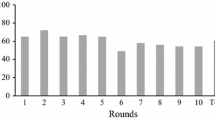Abstract
In a paper published in this journal, Cowen (2002) argues that whenever compliance with norms is supported by the forces of esteem, there is “too little” norm compliance. In this paper, we show that Cowen’s logic is flawed – that when the operation of esteem-based norms is formally modelled, no such general a priori conclusion follows. We investigate the conditions that would be necessary to ensure that esteem incentives for public goods contributions generate optimality in public goods supply, and indicate on that basis the conditions for voluntary sub-optimal and supra-optimal public goods provision in the esteem context.
Similar content being viewed by others
References
Buchanan, J. M. (1968). The demand and supply of public goods. Rand-McNally: Chicago.
Brennan, G., & Pettit, P. (1993). Hands invisible and intangible. Synthese, 94, 191–225.
Brennan, G., & Pettit, P. (2000). The hidden economy of esteem. Economics and Philosophy, 16, 77–98.
Brennan, G., & Pettit, P. (2004). The economy of esteem: Am essay on civil and political society. Oxford University Press: Oxford.
Cowen, T. (2002). The esteem theory of norms. Public Choice, 113, 211–224.
Holton, R. (forthcoming). Freedom, coercion and discursive control. In G. Brennan, R. Goodin, F. Jackson, & M. Smith (Eds.) Common minds. Oxford University Press: Oxford.
Lovejoy, A. O. (1961). Reflections on human nature. Johns Hopkins University Press: Baltimore.
Mandeville, B. (1732/1924). The fable of the bees. Oxford University Press: Oxford.
Smith, A. (1759/1982). The theory of moral sentiments. Liberty Classics: Indianapolis.
Author information
Authors and Affiliations
Corresponding author
Additional information
JEL Classification Welfare Theory – General (0240), Publicly provided goods, General (H400), Cultural economics, Social norms and social capital, Economic anthropology (Z130)
Rights and permissions
About this article
Cite this article
Brennan, G., Brooks, M. Esteem-based contributions and optimality in public goods supply. Public Choice 130, 457–470 (2007). https://doi.org/10.1007/s11127-006-9098-9
Received:
Accepted:
Published:
Issue Date:
DOI: https://doi.org/10.1007/s11127-006-9098-9



